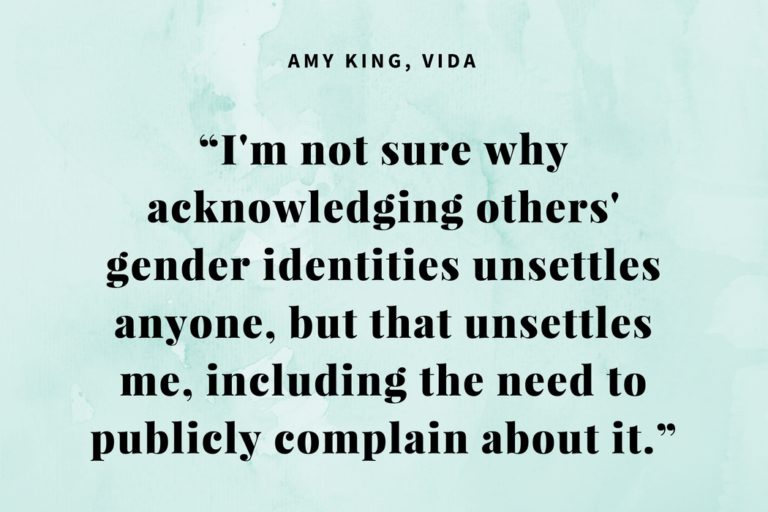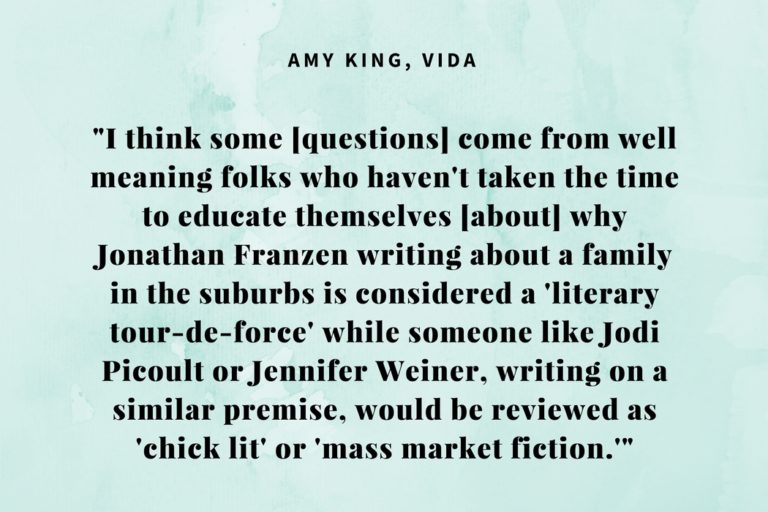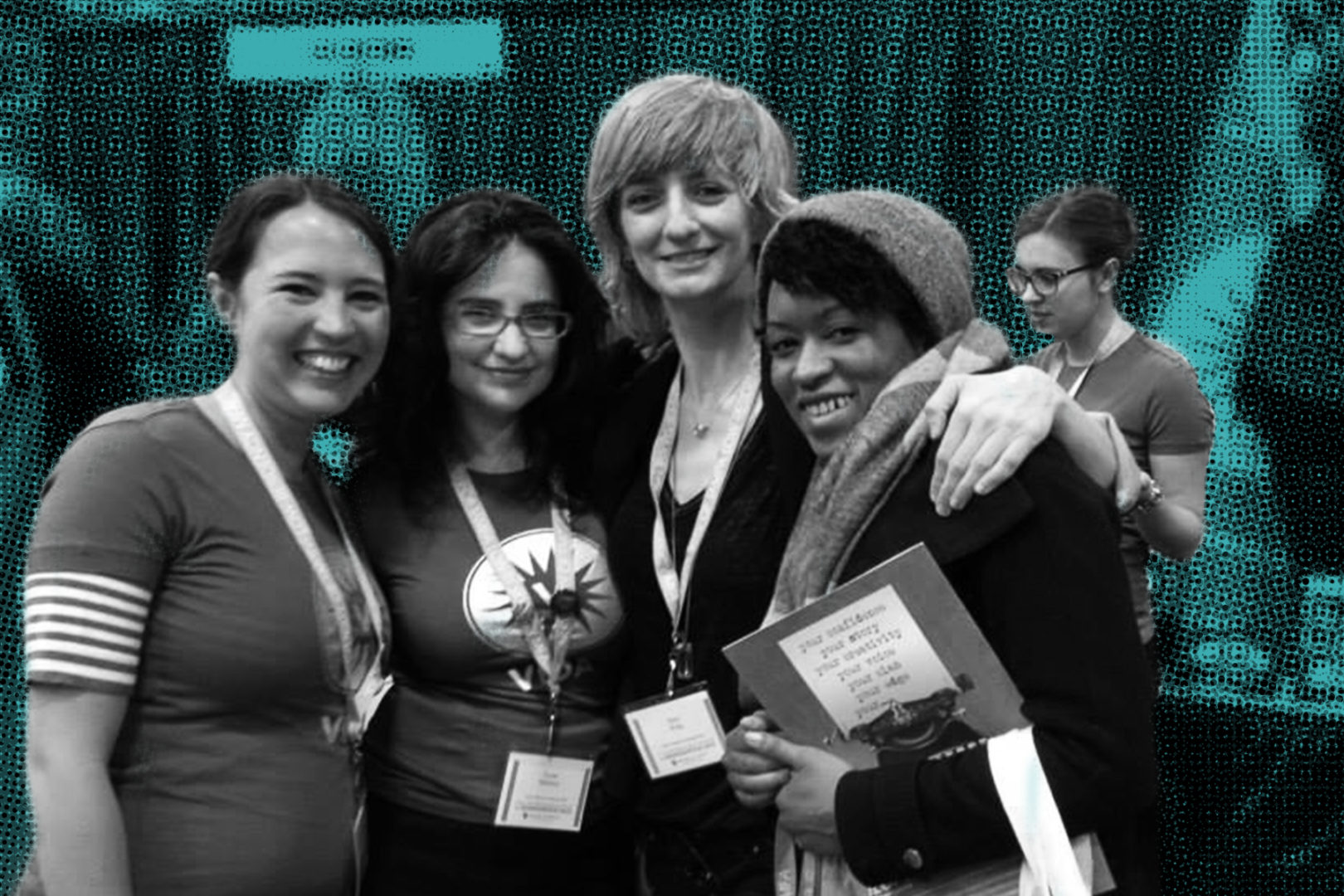VIDA reports on the state of gender parity in the literary scene.
By Joanna R. Demkiewicz
Photo provided by Amy King
Illustration by Grace Molteni
After almost 4,000 hours of combined labor from almost 60 volunteers, the friendly pie charts that reveal not-friendly truths are (almost) here. At the end of August, VIDA—the non-profit feminist organization that has been calling out the lack of gender parity in the literary industry since 2009—will release their 2016 Count, which will shine a spotlight on magazines and literary journals that offer bylines and coverage with integrity, or not.
Executive board member and poet Amy King has been with VIDA since the beginning, almost ten years ago, when writer Cate Marvin sent an email questioning the state of women in the literary scene to a group of women she respected. Marvin’s email snowballed, and she realized just how dire and disgusting the relationship between publishing and gender truly was. Along with Erin Belieu and Ann Townsend, Marvin launched VIDA and decided to do something about it by surveying major publications and releasing stats that break down bylines and coverage based on gender.
King compiled the bulk of the first VIDA Count and still has the printed out table-of-contents with handwritten notes in her office. “One day they’ll be in a museum, right?” she wrote to me. “Ha!”
For folks who plunge headfirst into wrestling with and combating discrimination in all forms and in many industries, a “ha” is necessary to punctuate just how bleak and complex it all continues to be. The 2010 Count revealed that the New York Review of Books published reviews of 306 books by men, and a paltry 59 by women. With each additional analysis, VIDA has celebrated trends that show publications are valuing more inclusive coverage, but most still have a lot of work to do, and others are subject to a see-saw effect—one year leveling the playing field, the next assembling content with hegemony-colored glasses.
In anticipation of the release of this year’s Count, I spoke with King about VIDA’s progress, dealing with the “but do women submit their work?” question, and the importance of recognizing your own biases.
Joanna Demkiewicz: In 2015, VIDA began considering race, sexuality, and disability in addition to gender when collecting data, and this year y’all added age and education to the Count. What has been the most surprising thing you’ve learned since expanding to include various identifying categories? What has been the most disheartening moment for you?
Amy King: I don’t think many of us were so much surprised by the results as disappointed in the huge omissions of writers across those demographics. On a personal note, I don’t think I realized how quickly language evolves with identity and experience. It’s been a learning experience to be part of the conversations on the VIDA Count committee as the volunteers there discuss what needs to be changed with each survey. [Board of Director member] Ashaki [Jackson] is a brilliant sociologist, and we’ve been incredibly lucky to have true activists weigh in throughout these conversations.
On a sad note, a few folks on social media have complained about the number of options for gender identities on our survey—publicly available on our FAQ page—which I find unsettling. Someone I follow on Twitter this morning surprised me by retweeting a complaint about the questions at a doctor’s office that also offer folks more than two options for gender. I’m not sure why acknowledging others’ gender identities unsettles anyone, but that unsettles me, including the need to publicly complain about it. Why does someone else’s gender identity undo some folks? I think this begs deeper questions, but I imagine this kind of public complaint is somehow rooted in the bias VIDA has always sought to make visible, so I take it as an indication that we’re still doing relevant, necessary work.

On a related note, another disappointment is that the majority of mainstream publications are still going along publishing zero non-binary writers based on the responses we have received to the VIDA survey (also available on our FAQ page).
JD: VIDA began in 2009 when a single email from Cate Marvin snowballed. Obviously social media existed in 2009, but 2017’s social engagement is a bit more malleable and people are using various platforms to communicate more directly with one another. In the same vein as Cate’s email spiraling, has anything specific happened on social media that was helpful to VIDA’s work?
AK: We’ve had a number of public responses to a few of our Reports from the Field [series] that involved some negative reaction, but much of that was overshadowed by folks expressing relief, gratitude and enthusiastic support for that platform. Lynn Melnick, our social media master, says that social media has been brilliant at bringing women together in the fight who may have previously felt isolated.
JD: In the past two years, articles that critique the lack of diversity and inclusivity in publishing have been widely circulated. I’m thinking of Molly Mcardle’s “You Will Be Tokenized” for Brooklyn Magazine; Rachel Deahl’s “Why Publishing Is So White” for Publishers Weekly; Jean Ho’s “Diversity In Book Publishing Isn’t Just About Writers—Marketing Matters, Too” for NPR; and Emily Gould’s “Most Women in Publishing Don’t Have The Luxury of Being Unlikable” for BuzzFeed. These articles examine publishing’s gendered and racial biases, but there are other ways in which the industry marginalizes, fails to consider, and discriminates authors and audiences alike. Do you have any articles on intersectionality that you could recommend?
AK: I asked a few VIDAs to weigh in on your question because of their work on the VIDA Review or their awareness via social media. My immediate answer is that Teen Vogue has been hitting it out of the park and making many slam-dunks since the presidential election, if I may mix my metaphors badly to convey how much I’m cheering them on.
Marcelle Heath, VIDA Review Managing Editor, suggests work from the Compassionate Curating series and the VIDA Looks Ahead: Where We Go From Here series, such as “Intersectionality and Activism in the Literary Landscape Podcast and Panelist Discussion” (featuring Cat Fitzpatrick, Kathi Wolfe, Jennifer Baker, Hafizah Geter, Jyothi Nataranjan, and Sarah Fawn) and “Where Do We Go From Here? Against Hegemony, Toward Integrity: The Dissident Artist’s Struggle” by Candace Williams.
Jessica Reidy, VIDA Review Acquisitions Editor, suggests reading the Bettering American Poetry series interviews. The heart of the series is how writers are making space for marginalized voices. Try the series’ interviews with Jos Charles and Fatimah Asghar.
Sarah Clark, VIDA Review Assistant Editor, suggests “Notes Toward a New Language: On Women Poets and Nourishment” by Cynthia Cruz and the Body of a Poem series in the VIDA Review, especially Raquel Salas Rivera’s essay “La Loca,” which explores their Puerto Rican identity, and how that relates to race, gender, activism, and artistry.
JD: What are some of the most archaic questions you get about your work at VIDA? How do you respond to them—or do you?
AK: Some of those questions are listed on our FAQs and in this piece by Danielle Pafunda, “Why Submissions Numbers Don’t Count,” simply because we grew tired of the redundancy—”But, are women publishing in the same numbers as men?” and “Do women submit as often as men?” For the most part, it is not difficult to understand that many of those archaic questions are really about derailing the now-visible lack of parity (thus legitimizing questions of bias) and, as well, they imply that the work women do is just not relevant or is subpar. The implication that women aren’t submitting work and getting published in sufficient numbers deserving of attention has become a joke at this point. It’s like saying, “We simply aren’t seeing worthwhile work written by women” as if we’re all still domestic goddesses incapable of putting pen to paper, when you don’t need to look far to locate an abundance of excellent writing by women. No volunteer I know falls for those questions anymore because, beyond the reasons stated, they’re also meant to eat up our energy and time, which could be spent on our own writing and supporting other writers.
Of course, there are more rabbit-hole questions that actually do get a bit more complex in terms of interrogating the kinds of subject matter and content that get published and reviewed, but again, those questions are like accounting for the history of why men’s voices are considered authoritarian while women speaking on the same subjects get shoved off into “lifestyle” niches. It’s just not possible to satisfactorily answer ideological questions like those in an email reply or on a social media post. Actually, we should likely add a list of suggested readings on our FAQ page for such questions, as I think some of those come from well meaning folks who simply haven’t taken the time to educate themselves and hope we can tell them why Jonathan Franzen writing about a family in the suburbs is considered a “literary tour-de-force” while someone like Jodi Picoult or Jennifer Weiner, writing on a similar premise, would be reviewed as “chick lit” or “mass market fiction.”

JD: Your website mentions that being a feminist is not a bumper-sticker—I’m paraphrasing, hopefully not too terribly—it requires constant engagement with your own biases and assumptions. How do you achieve this, both personally and professionally?
AK: Personally, I am always learning from working on the VIDA Review. The team there is incredible in terms of the content they solicit, and I feel in awe to be privy to the exchanges that take place throughout the editorial process. I keep learning so much about the various issues addressed but also about the sensitivity necessary to work on the activist content we publish and about how much evolves in terms of social change, political and ideological evolution and, simply put, how to care about others via the language between us. Baldly put, our voices and words shape what it means to be an ever-changing human. Writers—good writers—are always striving to accommodate that evolution, which means going beyond our knowledge and comfort zones and respecting and embracing what people say about themselves.
I never will forget a writer I know posting a couple of years ago about how she will never let go of the correct use of “them/they” just because someone wants to use it instead of a pronoun they don’t identify with. I was floored, not just by how undone and heels-dug-in she was, but by the realization that this was coming from a poet who was not, at minimum, attempting to stretch her certainty about the world to understand why someone might need that respect. She preferred a static law to the human it represented. A poet. So, I guess doing the work I’m doing where I do not know it all and am continuously learning is one way I try to confront my own biases.
Professionally, I’d say I try to be careful with the poems and essays I put into the world, and I get second and third readers who will be honest and say, “This could potentially be offensive” or “Try something else here.” As an educator, to put it succinctly, I try to create inclusive reading lists and foster a classroom of voices, plural. I’m not focused on comfort so much as respect and listening, as my classroom demographics are quite varied. That is, I want all of my students to participate on topics we’re not all experts on, and I do all that I can to make sure conversations evolve through the ideological and political differences in the room. Growth happens because you look and go beyond what you know. It goes without saying that listening to and actually hearing different opinions is not synonymous with being forced to adopt them.
JD: What’s next for VIDA?
We are currently at work organizing a VIDA Review anthology. We have published so much intelligent content on our website that we hope to get a good selection into classrooms and on bedside tables.
As for events, we are sponsoring a Brooklyn Book Festival Bookend event that will be amazing. It’s going to feature Hala Alyan, Alissa Nutting, Alana Massey, Tea Obreht, Camille Rankine, and AERIALISTS. Also, look out for new episodes of VIDA Voices & Views that we’re releasing in the next year, including interviews with Fatimah Asghar, Joy Harjo, and an AWP Exclusive with Joan Naviyuk Kane, Ada Limón, and Alicia Ostriker.

Must-reads from VIDA editors
Add these articles about intersectionality, integrity, and the internet to your reading list.
In the past two years, articles that critique the lack of diversity and inclusivity in publishing have been widely circulated. I’m thinking of Molly Mcardle’s “You Will Be Tokenized” for Brooklyn Magazine; Rachel Deahl’s “Why Publishing Is So White” for Publishers Weekly; Jean Ho’s “Diversity In Book Publishing Isn’t Just About Writers—Marketing Matters, Too” for NPR; and Emily Gould’s “Most Women in Publishing Don’t Have The Luxury of Being Unlikable” for BuzzFeed. These articles examine publishing’s gendered and racial biases, but there are other ways in which the industry marginalizes, fails to consider, and discriminates authors and audiences alike.
I asked VIDA executive board member Amy King to recommend articles that include analyses of other ways publishing fails. I wondered, where are the articles about socio-economic and class-based biases in publishing; or the invisibility of folks with disabilities in publishing; or an analysis of trans folks working in the industry? She and three members of the VIDA team delivered.
But first, a note about VIDA’s dedication to original and inclusive content, from VIDA Review’s Assistant Editor Sarah Clark:
Now that the VIDA Review is coming into its own, we’re actively shifting to courting and cultivating writers from marginalized identities. Part of achieving that goal is building trust, and to that end we strive for cultivation that is as ethical as possible. We’ve been working to solicit more work from trans people, lower-income people, and people with disabilities. And we want to acknowledge the burden of this labor—oppressed writers writing about their oppression—as asking people to dig inside themselves, can be hard. A lot of these essays are still in process because the less privilege someone has, the less time they have to focus on anything but survival, sometimes. This is why we’ve already solicited work we’re not expecting to publish until September or October. I want anyone who writes for us to have flexible deadlines and be able to practice self-care, especially as we cope with the added traumas of this year. This is very emotional work for our editors as well (many who themselves are multiply-marginalized). Even for editors, reading and editing these pieces can take a toll. We’d rather do this work more slowly and responsibly than rush and lose trust from or overburden our writers, editors and readers.We also haven’t wanted to bait anyone into writing essays for the sake of demographic content. That’s why the Body Of A Poem series was left open-ended, and pushed to exist at all as a small step toward letting trans/non-binary people know we’re in this, too.
Amy King: I asked a few VIDAs to weigh in on your question because of their work on the VIDA Review or their awareness via social media. My immediate answer is that Teen Vogue has been hitting it out of the park and making many slam-dunks since the presidential election, if I may mix my metaphors badly to convey how much I’m cheering them on.
Marcelle Heath, VIDA Review Managing Editor, suggests work from the Compassionate Curating series and the VIDA Looks Ahead: Where We Go From Here series, such as “Intersectionality and Activism in the Literary Landscape Podcast and Panelist Discussion” (featuring Cat Fitzpatrick, Kathi Wolfe, Jennifer Baker, Hafizah Geter, Jyothi Nataranjan, and Sarah Fawn) and “Where Do We Go From Here? Against Hegemony, Toward Integrity: The Dissident Artist’s Struggle” by Candace Williams.
Jessica Reidy, VIDA Review Acquisitions Editor, suggests reading the Bettering American Poetry series interviews. The heart of the series is how writers are making space for marginalized voices. Try the series’ interviews with Jos Charles and Fatimah Asghar.
Sarah Clark, VIDA Review Assistant Editor, suggests “Notes Toward a New Language: On Women Poets and Nourishment” by Cynthia Cruz and the Body of a Poem series in the VIDA Review, especially Raquel Salas Rivera’s essay “La Loca,” which explores their Puerto Rican identity, and how that relates to race, gender, activism, and artistry.

Joanna R. Demkiewicz is a co-founder and the editorial director of The Riveter. She works as a book publicist for Milkweed Editions. Find her on Instagram @yannademkiewicz and Twitter @yanna_dem.
Grace Molteni is a Midwest born and raised designer, illustrator, and self-proclaimed bibliophile, currently calling Chicago home. She believes strongly in a “beer first, always, and only” rule, and is forever seeking the perfect dumpling. For more musings, work, or just to say hey check her out on Instagram.




